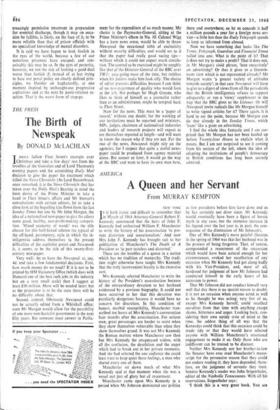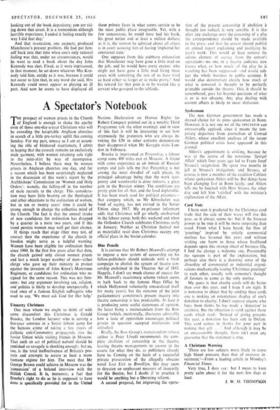A Queen and her Servant
AMERICA
From MURRAY KEMPTON
NEW YORK
Ir is both ironic and difficult to remember that in March of 1964 Attorney-General Robert F. Kennedy announced that the heirs of John F. Kennedy had authorised William F. Manchester to write the history of his assassination `to pre- vent distortion and sensationalism.' And now Mrs John F. Kennedy has brought suit to bar publication of Manchester's The Death of A President as 'in part tasteless and distorted.'
These are the troubles of a queen in a nation which has no tradition of monarchy. The tradi- tion might otherwise have taught Mrs Kennedy that the truly inconvenient loyalty is the excessive sort.
Mrs Kennedy selected Manchester to write the history of the President's assassination because of the extraordinary devotion to her husband evidenced by a previous biography. It could not have occurred to her that this devotion was peculiarly dangerous because it would have no concern for discretion. In this condition of honest, morbid susceptibility, Manchester tran- scribed ten hours of Mrs Kennedy's conversation four months after the assassination. For serious men, great personages are harder to resist when they show themselves vulnerable than when they show themselves grand. It was not Mrs Kennedy the Roman matron whom Manchester saw then but Mrs Kennedy the unappeased widow, with all the confusion, the desolation and the anger which had to break out in her private moments. And she had selected the one audience she could least trust to keep quiet those feelings, a man who shared every one of them.
Manchester set down much of what Mrs Kennedy said at that moment when she was a vessel not just of glory but of resentment.
Manchester came upon Mrs Kennedy in a period when Mr Johnson dominated our politics as few presidents before him have done and as he has certainly not done since. Mr Kennedy would eventually have been a figure of heroic myth in any case; but the immense increase in his legend over the last year is, in part, the con- sequence of the diminution of Mr Johnson's.
One of Mrs Kennedy's more painful illusions in the spring of 1964 was that her husband was in the process of being forgotten. That, of course, ,compounded a resentment of the succession which would have been natural enough for her circumstances, evoked her recollection of any occasion when Mr Kennedy had got along badly with his Vice-President, and, most of all, hardened her judgment of how Mr Johnson had conducted himself in the early hours of his accession to power.
That Mr Johnson did not conduct himself very well that day there is no special reason to doubt; it is not an occasion when anyone acted as well as he thought be was acting; very few of us, except Mrs Kennedy herself, could recollect ourselves from that time with anything except shame, bitterness and anger. Looking back, con- sidering their own untidy state of mind at the time, the oddest thing of all was that the Kennedys could think that this occasion could be made tidy or that they would have selected anyone with William Manchester's emotional engagement to make it so. Only those who are indifferent can be trusted to be discreet.
Neither Mrs Kennedy nor her brother-in-law the Senator have ever read Manchester's manu- script for the persuasive reason that they could not endure reading it; they have depended, there- fore, on the judgment of servants they trust. Senator Kennedy's reader was John Seigenthaler, editor of the Nashville Tennesseean. With all his reservations, Seigenthaler says: `I think this is a very great book. You are looking out of the book depository; you are rid- ing down that street. It is a tremendous although horrible experience. I ended it feeling exactly the way I did that day.'
And that re-creation, one suspects, produced Manchester's present problem. He had put him- self back into that time when one's only rational feeling was that, under no circumstances, would he want to read a book about the day John Kennedy was shot. Fixed, as it were imprisoned, in that moment, he set down whatever Mrs Ken- nedy told him, untidy as it was, because it could not occur to him that, in any word she said, Mrs Kennedy could never appear as playing an ill part. And now he seems to have displayed all those private faces in what seems certain to be the most public place imaginable. Yet, with a few concessions, he could have had his book, his great notice and at least a million dollars; as it is, the woman he admired above all others is in court accusing him of having 'exploited her emotional state.'
One supposes from this stubborn exhaustion that Manchester may have gone a little mad on the job; and he would have every excuse; who might not have gone a little mad living three years with something the rest of us have tried so hard either to forget or to make pretty? And his reward for that pain is to be treated like a servant who gossiped to the tabloids.































 Previous page
Previous page